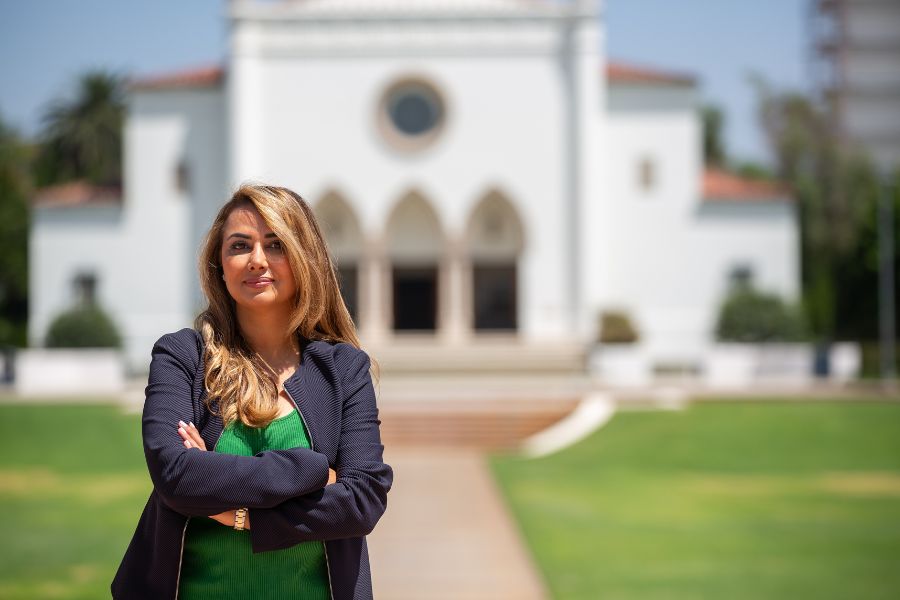
Anna Farzindar, Ph.D., has joined Loyola Marymount University Frank R. Seaver College of Science and Engineering as a clinical professor of computer science bringing decades of experience in artificial intelligence (AI), predictive machine learning, and natural language processing (NLP). She entered the field when the advent of the World Wide Web dramatically increased the popularity of statistical models for analyzing large volumes of data.
In 2005, Farzindar founded tech start-up NLP Technologies Inc. in Canada, a firm specializing in natural language processing, information technology, and intelligent systems. NLP Technologies is a leading developer of language service solutions such as automatic translation, summarization tools, social network analytics, and big data. For years, Farzindar worked with the Federal Courts of Canada using NLP techniques to analyze, digitize, convert, and summarize large volumes of legal precedents into multiple languages that are easily searchable and used by judges and lawyers for research purposes. The company was acquired in 2015 and Farzindar moved into academia to both teach and further her research opportunities in California.
Farzindar then joined the Department of Computer Science at University of Southern California to help expand the interdisciplinary data science program, where she contributed to the program’s success during the past nine years. She worked with health care providers to analyze medical data and create algorithms to predict graft failure in organ transplantation systems, which resulted in high patient success rates. She also advises several startups in the San Francisco Bay area in the field of machine learning, and works on responsible implementation of AI in innovative applications.
After teaching at other prestigious universities, she is excited to join LMU, where her work and teaching philosophy aligns with the university’s ethos of faith, justice and service, research reputation, and use of high-impact educational practices.

“My research interests are in AI and computational linguistics where we are basically training machines how to communicate with humans,” she said. Farzindar is the author and co-author of five books and more than 30 scholarly articles. She recently co-authored a book titled Natural Language Processing for Social Media and was co-editor and author of Transforming Healthcare with Big Data and AI. She is currently working on a documentary and book about ethics in AI.
Farzindar earned a Ph.D. in computer science from the University of Montreal and a doctorate in Natural Language Processing from Paris-Sorbonne University, graduating with the highest honors for the top 2 percent. She began her higher education at the Amirkabir University of Technology (Tehran Polytechnique) majoring in computer science as one of the first women enrolled in the engineering school. She also studied fine arts, painting, and sculpture at the School of Fine Arts of Versailles in France and the Ateliers Beau-Arts de Paris.
Subscribing to the idea that the arts and scientific research can collaborate to generate new innovations, Farzindar, an accomplished artist, weaves into her curriculum lessons about how artistic expression can help computer science students be more innovative.
“My recent artwork focuses on the intersection of art and technology, said Farzindar. “I use my art and paintings as visual educational materials for communication with my students in a new course I developed. My goal is to elevate student discussions about digital ethics and the fairness for correcting algorithmic bias in automated decision-making processes based on data and machine learning models. I integrate these concepts and artwork into this new course as a part of my teaching material.”
As a visiting professor during the 2022 – 23 academic year, Farzindar was involved in LMU’s Business, Engineering, Science and Technology (BEST) Bootcamp, a free certificate program for undergraduate students jointly offered by Seaver College and LMU College of Business Administration. “In today’s tech-driven world, LMU’s business and engineering disciplines play crucial roles in driving innovation, economic growth, and societal development aligned with the university’s mission to educate the whole person,” said Farzindar. “This bootcamp provides our students with the opportunity to develop complementary skills in both innovation and problem-solving in an entrepreneurial context.” During the bootcamp, Farzindar emphasized the importance of ethics in AI in business and limitations of those technologies. Bootcamp discussions involved respecting the privacy of customers in data collection, being aware of biases in machine learning algorithms, and addressing the poor definition of AI goals in rapidly developing environments that cause problems.
“I am looking forward to facilitating more interdisciplinary collaboration at LMU,” said Farzindar. “Through my experience in the industries of law, health care, communications, and social media, I see Seaver College collaborating with many other academic disciplines. I am working on the development of more interdisciplinary courses for both computer science and non-computer science majors, as well as looking at future research opportunities for student participation.”



